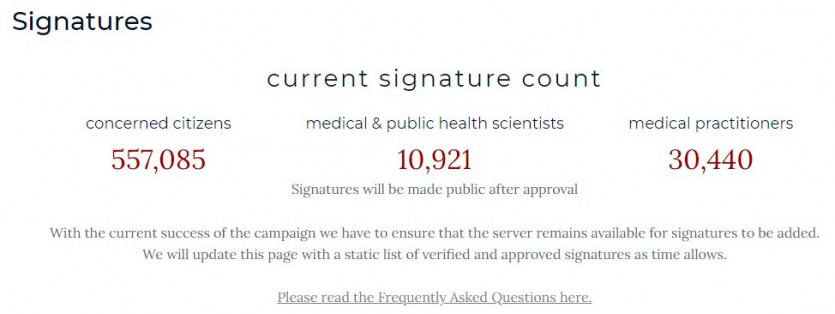그레이트 배링턴 선언문 전문 및 서명 링크 (집단면역 지지) - 하버드의대/스탠포드의대/옥스퍼드대 교수 등)
페이지 정보
본문
http://gbdeclaration.org
그레이트 배링턴 선언문
감염병 역학과 공중보건 전문가로서, 우리는 현재의 COVID-19 대응전략이 초래하는 신체적, 정신적 피해에 대하여 심각한 우려를 하고 있으며 고위험군 집중 보호 전략으로 수정이 필요함을 제안하고자 한다.
정치적 입장에 관계없이 우리는 지금까지 사람들의 건강을 보호하기 위하여 헌신적으로 일해왔다. 그러나 현재의 락다운 정책은 단기적 그리고 장기적으로 공공의 건강에 엄청난 악영향을 끼친다. 예를 들면, 어린이 백신 접종률 저하, 심혈관계 질환 악화, 암 조기검진율 저하, 정신건강 악화 등이 있다. 이 문제들은 향후 COVID-19보다 훨씬 더 많은 사망자를 양산하게 될 것이며, 젊은 세대에 가장 무거운 부담을 지우게 될 것이다. 특히 학생들이 학교를 가지 못하는 것은 그 자체로 중대한 불평등이다.
백신이 개발될 때까지 이러한 조치를 유지하는 것은 사회 전체에 회복 불가능한 피해를 가져올 것이며, 이때 취약계층의 피해는 가장 심각할 것이다.
다행히 바이러스에 대한 지식이 늘어나면서 우리는 이제 노년층의 COVID-19로 인한 사망위험이 젊은 층보다 1,000배 이상 더 높다는 것을 알고 있다. 어린이의 사망 위험은 독감과 같은 다른 흔한 질병들보다도 낮다.
한 인구집단에서 면역을 가지는 사람이 증가하게 되면, 고위험군을 포함한 모든 사람들의 감염 위험도가 낮아지게 된다. 우리는 감염병 유행시 모든 인구집단이 궁극적으로 집단면역-즉, 새로운 감염자가 생기는 속도가 일정해지는 지점-에 이르게 된다는 사실을 알고 있다. 백신은 집단면역을 올리는데 도움을 줄 수 있지만 유일한 방법은 아니다. 따라서 우리의 목표는 집단면역에 이를 때까지 COVID-19로 인한 사망과 사회적 피해를 최소화하는 것에 맞추어져야 한다.
집단면역에 이를 때까지 발생 가능한 위험과 그로 인한 혜택을 균형감 있게 고려한 적절한 방법은 다음과 같다. 고위험군은 보호한 상태에서, 아주 낮은 사망 위험을 가진 사람들은 자연감염을 통하여 바이러스에 대한 면역을 획득할 수 있도록 평소와 같은 삶을 허락하는 것이다. 우리를 이를 고위험군 집중 보호 전략이라고 부른다.
고위험군 보호를 위한 전략들이 COVID-19에 대한 공중보건학적 대책의 핵심이 되어야 한다. 예를 들어, 요양원은 면역을 가진 직원을 근무하도록 하고 면역이 없는 직원이나 방문객에 대하여서는 주기적인 PCR 검사를 시행하여야 한다. 또한 직원의 교대는 최소화하여야 한다. 단독으로 거주하는 고령자들에게는 필요한 식료품과 일상생활용품을 배달하는 서비스를 제공하고, 가족을 만날 필요가 있다면 실내가 아닌 실외에서 만날 수 있도록 도와주어야 한다. 여러 세대가 함께 거주하는 고령자들을 포함하여, 다양한 고위험군을 보호하기 위한 포괄적이고 자세한 수칙들을 마련하여 실행할 수 있다.
한편, 위험도가 낮은 사람들은 손 씻기와 아플 때 집에 머무는 것과 같은 간단한 위생수칙만 지키면서 즉시 정상생활을 시작할 수 있어야 한다. 모든 학교는 대면 강의를 시행하여야 한다. 스포츠와 같은 방과 후 활동들도 재개되어야 한다. 건강한 성인들은 재택근무가 아닌 정상적으로 출근하여야 한다. 식당과 다른 가게들도 열어야 한다. 예술, 음악, 스포츠, 그리고 다른 모든 문화활동들도 재개되어야 한다. 위험도가 다소 높은 사람들조차 본인이 원한다면 이러한 활동에 참여할 수 있다. 이러한 과정을 통하여 사회는 집단면역을 서서히 올려갈 수 있으며, 이는 결국 고위험군을 포함한 사회 전체를 보호하는 결과로 이어지게 된다.
2020년 10월 4일 미국 그레이트 배링턴에서 작성하고 서명함
Dr. Martin Kulldorff 하버드 의대 교수, 생물통계학자, 역학자, 감염병 유행 및 백신 안전성 평가 전문가
Dr. Sunetra Gupta 옥스퍼드 대학교 교수, 역학자, 면역학, 백신 개발 및 감염병 수학 모델링 전문가
Dr. Jay Bhattacharya 스탠퍼드 의대 교수, 의사, 역학자, 보건경제학자, 감염병과 취약계층 관련 공중보건정책 전문가
The Great Barrington Declaration
The Great Barrington Declaration – As infectious disease epidemiologists and public health scientists we have grave concerns about the damaging physical and mental health impacts of the prevailing COVID-19 policies, and recommend an approach we call Focused Protection.
Coming from both the left and right, and around the world, we have devoted our careers to protecting people. Current lockdown policies are producing devastating effects on short and long-term public health. The results (to name a few) include lower childhood vaccination rates, worsening cardiovascular disease outcomes, fewer cancer screenings and deteriorating mental health – leading to greater excess mortality in years to come, with the working class and younger members of society carrying the heaviest burden. Keeping students out of school is a grave injustice.
Keeping these measures in place until a vaccine is available will cause irreparable damage, with the underprivileged disproportionately harmed.
Fortunately, our understanding of the virus is growing. We know that vulnerability to death from COVID-19 is more than a thousand-fold higher in the old and infirm than the young. Indeed, for children, COVID-19 is less dangerous than many other harms, including influenza.
As immunity builds in the population, the risk of infection to all – including the vulnerable – falls. We know that all populations will eventually reach herd immunity – i.e. the point at which the rate of new infections is stable – and that this can be assisted by (but is not dependent upon) a vaccine. Our goal should therefore be to minimize mortality and social harm until we reach herd immunity.
The most compassionate approach that balances the risks and benefits of reaching herd immunity, is to allow those who are at minimal risk of death to live their lives normally to build up immunity to the virus through natural infection, while better protecting those who are at highest risk. We call this Focused Protection.
Adopting measures to protect the vulnerable should be the central aim of public health responses to COVID-19. By way of example, nursing homes should use staff with acquired immunity and perform frequent PCR testing of other staff and all visitors. Staff rotation should be minimized. Retired people living at home should have groceries and other essentials delivered to their home. When possible, they should meet family members outside rather than inside. A comprehensive and detailed list of measures, including approaches to multi-generational households, can be implemented, and is well within the scope and capability of public health professionals.
Those who are not vulnerable should immediately be allowed to resume life as normal. Simple hygiene measures, such as hand washing and staying home when sick should be practiced by everyone to reduce the herd immunity threshold. Schools and universities should be open for in-person teaching. Extracurricular activities, such as sports, should be resumed. Young low-risk adults should work normally, rather than from home. Restaurants and other businesses should open. Arts, music, sport and other cultural activities should resume. People who are more at risk may participate if they wish, while society as a whole enjoys the protection conferred upon the vulnerable by those who have built up herd immunity.









